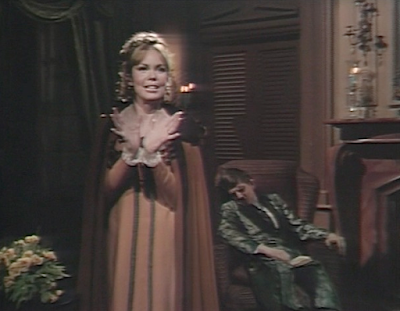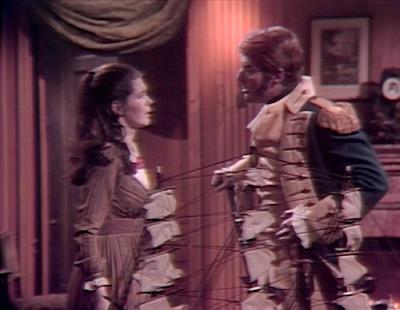The more efficient a means of communication is, the sooner it is likely to be choked with unwanted messages, some of them harmful to recipients who engage with them. We describe this tendency by saying that eventually, everything turns into email.
One of the most potent means of communication on Dark Shadows have been dream visitations from supernatural beings. As early as #10, matriarch Liz, who in waking life resolutely denied that any paranormal phenomena could be found on the estate of Collinwood, writhed as she slept in her armchair, muttering about ghosts. Since then, we’ve seen undead fire witch Laura Murdoch Collins and the spirit of the benevolent Josette send competing dreams to influence strange and troubled boy David; the mysterious Widows have beckoned Liz to a watery grave; the ghost of little Sarah Collins visited David and told him all about her big brother, then-vampire Barnabas; revenant Jeremiah Collins and phantom Nathan Forbes have given important information to well-meaning governess Vicki; and several characters have had vivid dreams of unspecified, but obviously supernatural, provenance.
Today, wicked witch Angelique visits Barnabas in a dream and tells him that she is launching a malware attack on the dreamers of Collinsport. It’s going to be sequential; it will take over each user’s wetware in turn, compelling them to forward it to someone else. With each iteration, the worm will become more complex, until it reaches Barnabas in a dream of his own. When he accesses it, he will revert to vampirism.

On his Dark Shadows Every Day, Danny Horn made a detailed comparison of Angelique’s explanation of the Dream Curse with the introduction to the 1931 film Frankenstein. He’s convinced me that the reference was intentional. Since there is a version of Frankenstein playing out on Dark Shadows right now, they are assuring us that the Dream Curse storyline will intersect with that one.
Angelique’s explanation only takes up the last act of the episode. There is a lot of other good stuff in the earlier parts, most revolving around Jerry Lacy’s character Tony Peterson. Tony was first introduced as a showcase for Mr Lacy’s famous Humphrey Bogart imitation; he has discarded that now. He still wears a brown suit and a tan overcoat, but sounds like Jerry Lacy.
Tony quarrels with heiress Carolyn about her relationship with Barnabas. She tells him that she and Barnabas have no romantic interest in each other, and tells him to go ask Barnabas if he doesn’t believe her. He goes to Barnabas’ house, and gives Jonathan Frid a rare opportunity to play intentional comedy.
Angelique, who, under the name Cassandra, has married sarcastic dandy Roger Collins and is living with him in the great house at Collinwood, steals Tony’s lighter and uses it to cast a spell on him. She needs a helper, and has decided to enslave Tony. Mr Lacy and Lara Parker are such fun together that, decades after the show, a company called Big Finish brought them back as Tony and Cassandra in a series of audio dramas. Called The Tony and Cassandra Mysteries, they were among the most popular of the Dark Shadows-themed plays Big Finish put out. I haven’t heard any of them- I’m too stingy to pay $37.41 to download an audio file- but if the scene the two of them play in the gazebo at Collinwood today is any indication, I’m sure they’re wonderful.
The very beginning of the episode is good too. Carolyn is coming back from a trip and has her hands full of luggage, so she knocks on the front door of the great house rather than look for her key. Angelique/ Cassandra answers. Carolyn has no idea who she is. When Angelique/ Cassandra identifies herself as Roger’s wife, Carolyn is shocked that Roger has remarried. She is even more shocked when Angelique/ Cassandra says that she and Roger had known each other only a day when they were married. Nancy Barrett is a high-energy actress, and a tightly-focused one. Her reactions to Angelique/ Cassandra’s successive announcements are like a laser light show on the theme of stunned disbelief.
Carolyn mentions that David decided to stay on in Boston for a few days. Since David is about ten years old, we might expect some explanation as to his lodging, but none is forthcoming. Some time ago we heard about an “Aunt Catherine” in Boston; I suppose he might be at her house, but hey, if the alternative is Collinwood he wouldn’t be any less safe if he were roughing it around Mass and Cass.






